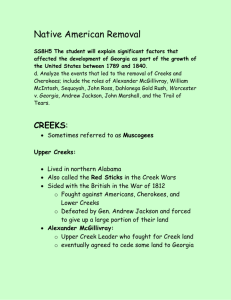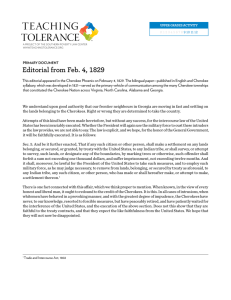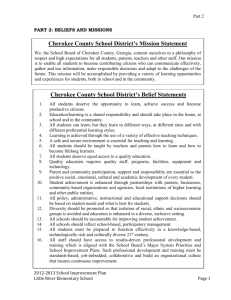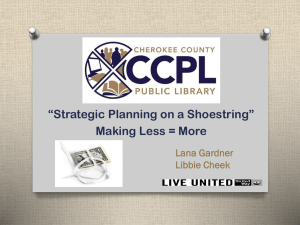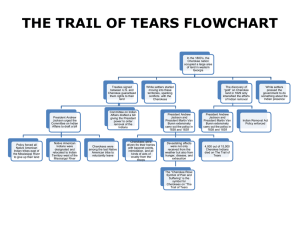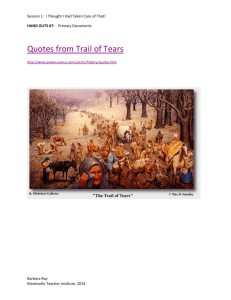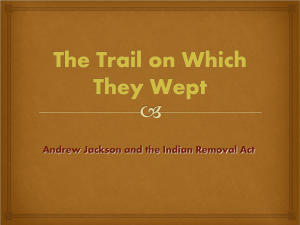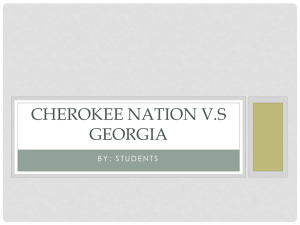Biographies of Key Historical Figures_CT
advertisement
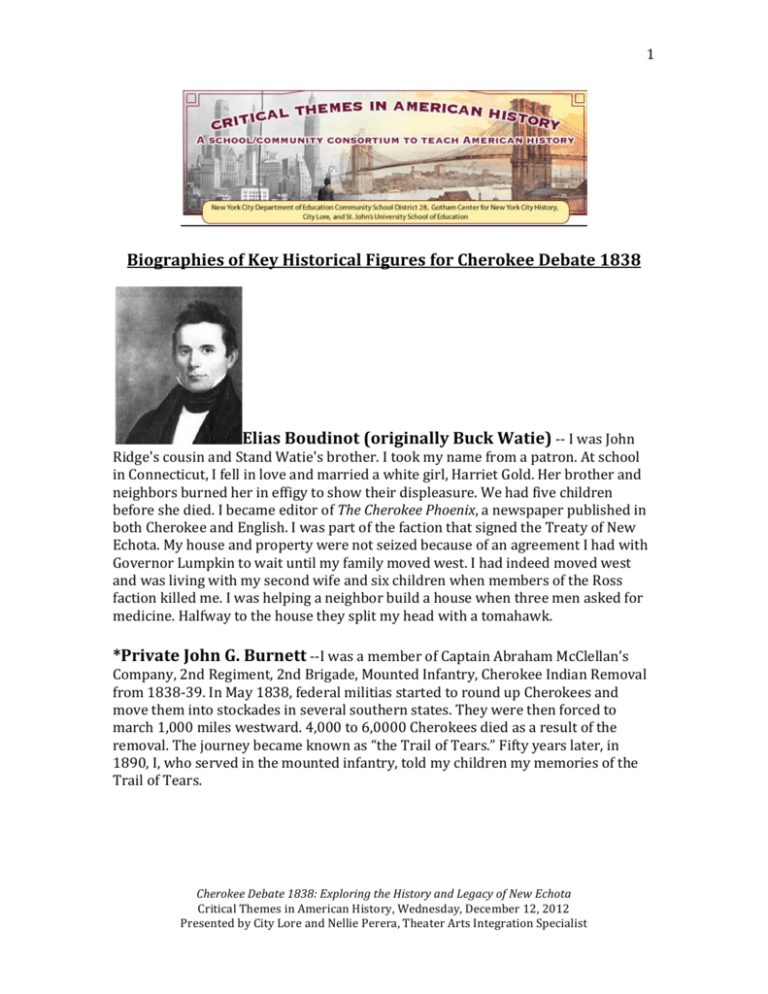
1 Biographies of Key Historical Figures for Cherokee Debate 1838 Elias Boudinot (originally Buck Watie) -­‐-­‐ I was John Ridge's cousin and Stand Watie's brother. I took my name from a patron. At school in Connecticut, I fell in love and married a white girl, Harriet Gold. Her brother and neighbors burned her in effigy to show their displeasure. We had five children before she died. I became editor of The Cherokee Phoenix, a newspaper published in both Cherokee and English. I was part of the faction that signed the Treaty of New Echota. My house and property were not seized because of an agreement I had with Governor Lumpkin to wait until my family moved west. I had indeed moved west and was living with my second wife and six children when members of the Ross faction killed me. I was helping a neighbor build a house when three men asked for medicine. Halfway to the house they split my head with a tomahawk. *Private John G. Burnett -­‐-­‐I was a member of Captain Abraham McClellan’s Company, 2nd Regiment, 2nd Brigade, Mounted Infantry, Cherokee Indian Removal from 1838-­‐39. In May 1838, federal militias started to round up Cherokees and move them into stockades in several southern states. They were then forced to march 1,000 miles westward. 4,000 to 6,0000 Cherokees died as a result of the removal. The journey became known as “the Trail of Tears.” Fifty years later, in 1890, I, who served in the mounted infantry, told my children my memories of the Trail of Tears. Cherokee Debate 1838: Exploring the History and Legacy of New Echota Critical Themes in American History, Wednesday, December 12, 2012 Presented by City Lore and Nellie Perera, Theater Arts Integration Specialist 2 Henry Clay -­‐-­‐I was a white politician best known for the doctrine of states rights and nullification. I advocated the War of 1812, a protective tariff, and the national bank. I was also a strong supporter of slavery and the annexation of Texas. I became known as the Great Compromiser because I helped settle bitter disputes over slavery and did much to hold the nation together during the first half of the 1800's. I drafted the Missouri Compromise, the Compromise of 1850, and the compromise tariff that kept S.C. from seceding. I served in both the U.S. House and Senate. I ran for president five times without winning. I was defeated by John Q. Adams but became his secretary of state. I was also defeated by Andrew Jackson who never liked me. I thought the Schermerhorn treaty, or the Treaty of New Echota as it was called, was "un-­‐just, dishonest, cruel, and short sighted in the extreme." **Ralph Waldo Emerson -­‐-­‐ American poet, essayist, and philosopher Ralph Waldo Emerson was born in 1803 in Boston, Massachusetts. After studying at Harvard and teaching for a brief time, Emerson entered the ministry. He was appointed to the Old Second Church in his native city, but soon became an unwilling preacher. Unable in conscience to administer the sacrament of the Lord's Supper after his nineteen-­‐year-­‐old wife died of tuberculosis, Emerson resigned his pastorate in 1831. The following year, he sailed for Europe, visiting Thomas Carlyle and Samuel Taylor Coleridge. Carlyle, the Scottish-­‐born English writer, was famous for his explosive attacks on hypocrisy and materialism, his distrust of democracy, and his highly romantic belief in the power of the individual. Emerson's friendship with Carlyle was both lasting and significant; the insights of the British thinker helped Emerson formulate his own philosophy. Cherokee Debate 1838: Exploring the History and Legacy of New Echota Critical Themes in American History, Wednesday, December 12, 2012 Presented by City Lore and Nellie Perera, Theater Arts Integration Specialist 3 On his return to New England, Emerson became known for challenging traditional thought. In 1835, he married his second wife, Lydia Jackson, and settled in Concord, Massachusetts. Known in the local literary circle as "The Sage of Concord," Emerson became the chief spokesman for Transcendentalism, the American philosophic and literary movement. Centered in New England during the 19th century, Transcendentalism was a reaction against scientific rationalism. Although Emerson’s letter to Van Buren is strongly worded, he was really a reluctant political activist. However, he was ultimately drawn into the abolitionist movement . Chief Junaluska -­‐-­‐ I was born and grew up in what is now North Carolina and was friends with Will Thomas. I led a war party that joined the army of Jacksa Chula Harjo at the Battle Horse Shoe Bend (1814) during the War of 1812. I swam a river to get canoes and got the Cherokee forces behind the Red Sticks so that we won the battle. I also saved Jackson's life. If I had known that Jackson would drive us from our homes, I would have killed him that day at the Horse Shoe. I thought he was a good man. I could not believe that he ran us from our homes. I led one of the groups that left on the Trail of Tears in October 1838 but I was determined to return home. I walked back to North Carolina traveling through woods and unoccupied districts to avoid recapture. My friend Will Thomas helped me reclaim a former residence. That state gave me citizenship rights. My descendants still live there. Andrew Jackson -­‐-­‐I was President of the U.S. when the Treaty of Removal was negotiated, but Van Buren had to execute the removal of the Cherokees. I was the first president born in a log cabin, and an orphan at 14. I carried a scar from the American Revolution because I would not black an officer's boots. When he struck me with his sword, I threw up my arm, but he cut my hand and head to the bone. I become a lawyer in North Carolina and a prosecutor in Nashville, Tennessee. There I met Rachel. We fell in love and were married only to learn two years later that her first husband had not divorced her when he said he did. We were married again, but I fought many duels defending Rachel's honor. Cherokee Debate 1838: Exploring the History and Legacy of New Echota Critical Themes in American History, Wednesday, December 12, 2012 Presented by City Lore and Nellie Perera, Theater Arts Integration Specialist 4 I served in the House and the Senate representing Tennessee, but I liked riding the circuit for Superior Courts much better. My troops nicknamed me "Old Hickory" because I was tough as wood in the War of 1812. When I went to fight the Creeks after the Fort Mims massacre I had 2500 men including Davy Crockett. After our victory at Horseshoe Bend, I sent Rachel a Creek orphan boy that we raised as our own until he died of tuberculosis. We never had children, but we adopted a twin boy from Rachel's brother and raised at least five other children, and we were guardians for two families of Butler children. I won the Battle of New Orleans with no weapons except what I could take from the civilians and with help from the pirate Jean Lafitte. After some military exploits in Florida, I got a reprimand and was sent back as governor to get me out of the way. I believed a good citizen should never seek an office and never decline one. I won the popular vote for president in 1824 but lost the election when Clay threw his support to Adams and became his Secretary of State. The campaign of 1828 was very bitter and I am convinced that the mudslinging about Rachel helped kill her. She died before I was sworn in. The people nearly wrecked the White House that day, smashing china and muddying chairs with their boots as they climbed up to see me. We had to move the punch out onto the lawn to get them out. There were a number of issues during my two terms: I refused to recharter the Bank of the United States or to let supporters of nullification break up the Union over tariffs. I got the Indian Removal Act passed and made France repay their debt owed from the Napoleonic wars. I wanted to see Texas admitted as part of the union, and I learned just before I died that this had finally occurred. John Marshall—I was the 4th chief justice of the United States and served longer than any other justice, from 1801 to 1835. When I became chief justice, the Supreme Court commanded little respect. I was sometimes ignored, especially by Andrew Jackson on the Indian issue, but I still raised the court to a level equal to the executive and legislative branches. I believed that we needed a strong central government to grow, and my arguments gave the court power to overrule states when national and state interests collided. I become known as the "'Great Chief Justice" because of my impact on the judicial system. Cherokee Debate 1838: Exploring the History and Legacy of New Echota Critical Themes in American History, Wednesday, December 12, 2012 Presented by City Lore and Nellie Perera, Theater Arts Integration Specialist 5 ***Benjamin Parks – I claimed to have been the first to discover gold in Georgia, possibly in 1828. When I was a child, my family moved from North Carolina to Hall County, GA. We had many Cherokee neighbors and were welcomed among them. Major Ridge -­‐-­‐ was my English name. It came from Ka-­‐nun-­‐ da-­‐cla-­‐geh in Cherokee, which meant "he who walks on the mountains.” The English shortened it to The Ridge, and I took Major from my rank when I served with Andrew Jackson at Horse Shoe Bend. I didn't always fight with the Americans. I had taken many scalps during the Revolution. But even as a full-­‐blooded Cherokee, I could see some value to the white ways. I became a thriving planter with 30 slaves and 280 acres with 1500 fruit trees and a ferry on the Oostenaula River. I remodeled my cabin into a Piedmont style planter's house end sent my son John to a mission school in Connecticut. I spoke only a few words of English, but I understood more. I had killed Doublehead when he signed away land in 1802 without sanctions of the tribe, but I finally decided my people would do better to take what we could get and leave safely. I was one of the ones who signed the Treaty of New Echota, knowing that I was signing my death warrant. I left with my relatives and 600 followers equipped with slaves, horses, oxen, carriages, and wagons and arrived in Indian Territory in time to plant spring crops on choice land. My group was the only one to arrive with no deaths. But I knew my days were numbered. I was murdered just as I had killed Doublehead, according to the law of our tribe. I was ambushed by people of the Ross faction, shot twelve times, and trampled by my frightened horse. John Ridge -­‐-­‐I was the son of Major Ridge of the Deer Clan. An alumnus of New England missionary schools, I wrote poetry and married a white girl, Sarah Northrup. I spent much time traveling and speaking to raise money Cherokee Debate 1838: Exploring the History and Legacy of New Echota Critical Themes in American History, Wednesday, December 12, 2012 Presented by City Lore and Nellie Perera, Theater Arts Integration Specialist 6 to convert the Indians. Although a full-­‐blood, I turned my back on what I had been taught to see as savagery. I left Georgia with my father and followers before the forced removal and settled near Honey Creek. Shortly after the Ross faction arrived, I was pulled from my bed and stabbed to death 25 times in view of my wife and children. This was my payment according to Cherokee law for signing away land without the tribal sanction. John Ross -­‐-­‐Although only 1\8 Cherokee, I became the principal chief of the Cherokees. I was born in what became Etowah County, Alabama. My father was a Scotsman who owned a store and tannery and had built the town of Rossville. I was sent to schools in Tennessee and was a classmate of Sam Houston. The Indians called me Cooweescooweee, or White Bird. I chose to go the Indian way and married a young full-­‐blood widow with one daughter. My wife was called Quatie. During the War of 1812 and the Creek War, I held the rank of major and served as adjutant to Andrew Jackson. Afterwards, I built a store, warehouse, and boat dock that I sold to buy a plantation. By 1835 I had 19 slaves. When I returned from a trip to Congress, I found Quatie and two children imprisoned in a bedroom, a result of the Georgia land lottery. We moved to Tennessee to the log cabin where my father had been. I fought through the courts to keep the Cherokee land for my people. I knew every U.S. politician who sympathized with the Cherokee: Henry Clay, David Crockett, Sam Houston, Daniel Webster, Edward Everett, Horace Everett, Peleg Sprague, Theodore Frelinghuysen, and Henry Wise. It was not enough. When I could not prevent the removal, I took charge and helped supervise so my people would get better treatment. We could not control the drought and then the sudden, cold winter so we lost many people. I buried Quatie at Little Rock. Some tried to blame me for the Ridge and Boudinot murders, but I was not responsible. I tried to get my people to live in peace and to settle in peace. I remarried later and built Rose Cottage. I died in Washington, D. C., still negotiating for the Cherokee. Reverend J. F. Schermerhorn-­‐-­‐Although a minister, my principles were flexible enough to permit me to license the proprietors of grog shops that were daily stupefying Indian patrons. I acted as an agent for the U. S. government and handled the signing of the Treaty of New Echota by some of the Cherokees. They called me "Devil’s Horn." Cherokee Debate 1838: Exploring the History and Legacy of New Echota Critical Themes in American History, Wednesday, December 12, 2012 Presented by City Lore and Nellie Perera, Theater Arts Integration Specialist 7 General Winfield Scott -­‐I was an army officer for more than 50 years, serving in the War of 1812, the Mexican War, and the Civi1 War. My troops called me "Old Fuss and Feathers" because I believed in details. I prepared the first complete manual of military tactics in the U. S. Army. I was sent to roundup and move the Cherokees to the West because they had not gone according to the treaty. I instructed my men to treat them fairly and allowed Ross to supervise the removal and delay until after the drought and heat. When the Civil War broke out, I refused to join the Southern forces and retired from the army. Will H. Thomas -­‐-­‐My father was a white trader who died when I was young, and I was adopted by Chief Yonagusta as a boy. I prepared for law by self study and became the attorney for my adopted people. I was able to obtain money for them on several occasions and served in the North Carolina Senate. During the Civil War, I served as a colonel for the Confederacy and led 200 of the Qualla on guard duty in mountain passes between Gatlinburg and Cherokee. I came out of the war sick and heavily indebted because of land speculations. When the courts got through trying to separate my personal investments from those done for my people, they found some 67,000 acres, mostly unsurveyed, belonging to the Indians I had represented. The courts had this surveyed and placed it under trusteeship of the Commissioner of Indian Affairs in Washington, D. C., designating the Indians as the Eastern Band of Cherokee Indians. Cherokee Debate 1838: Exploring the History and Legacy of New Echota Critical Themes in American History, Wednesday, December 12, 2012 Presented by City Lore and Nellie Perera, Theater Arts Integration Specialist 8 Charlie Tsali -­‐-­‐ When the roundup for removal began, my family was herded toward a stockade. An impatient soldier prodded my wife with a bayonet, a real insult to my race and my family. When I got the chance, I jumped the soldier, killed him, and escaped with my family into the mountains. General Scott sent Will Thomas to find me. He offered to let the others stay hidden in the mountains if my sons and I would come to be shot. We did. My youngest son was just a boy, so he was spared. Today in Cherokee, North Carolina, you can see my descendants and hear our story in the drama "Unto These Hills." ****Samuel Worcester – I was a native of Vermont, and a minister affiliated with the American Board of Commissioners for Foreign Missions (ABCFM). In 1827 the board ordered me to the Cherokee national capital of New Echota, in Georgia. Upon my arrival I began working with Elias Boudinot, the editor of the Cherokee Phoenix, to translate the Bible and other materials into the Cherokee language. Over time I became a close friend of the Cherokee leaders and often advised them about their political and legal rights under the Constitution and federal-­‐Cherokee treaties. The Georgia government recognized that I was influential in the Cherokee resistance movement and enacted a law that prohibited "white persons" from residing within the Cherokee Nation without permission from the state. Several missionaries, myself included, decided to challenge the law and refused to leave the state. On March 12, 1831, Georgia authorities arrested me and a few others, but Georgia judge released me when my lawyers argued that I served as federal postmaster at New Echota and was therefore in the Cherokee Nation under authority of the federal government. Governor George R. Gilmer persuaded the United States to relieve me of my postmaster duties and then ordered the missionaries to leave the state. Three of the missionaries gave up the fight and abandoned their missions. But I remained, along with a few of my colleagues, and on July 7, 1831, the Georgia Guard again arrested us. After posting bond I returned to New Echota, and the Georgia Guard arrested me for the third time. In September we missionaries were tried, convicted, and sentenced to four years in prison at hard labor. We were sent to the Georgia penitentiary at Milledgeville. (see below) Cherokee Debate 1838: Exploring the History and Legacy of New Echota Critical Themes in American History, Wednesday, December 12, 2012 Presented by City Lore and Nellie Perera, Theater Arts Integration Specialist 9 Worcester vs. Georgia – I, Samuel Worcester, and other missionary detainees were represented by lawyers hired by the Cherokee Nation, who appealed to the U.S. Supreme Court. In Worcester v. Georgia, the court struck down Georgia's extension laws. In the majority opinion Marshall wrote that the Indian nations were "distinct, independent political communities retaining their original natural rights" and that the United States had acknowledged as much in several treaties with the Cherokees. Although it had surrendered sovereign powers in those treaties with the United States, he wrote, the Cherokee Nation remained a separate, sovereign nation with a legitimate title to its national territory. Marshall harshly rebuked Georgia for its actions and declared that the Cherokees possessed the right to live free from the state's trespasses. The Cherokee leadership hoped the decision would persuade the federal government to intervene against Georgia and end the talk of removal. Georgia ignored the Supreme Court's ruling, refused to release the missionaries, and continued to press the federal government to remove the Cherokees. President Jackson did not enforce the decision against the state and instead called on the Cherokees to relocate or fall under Georgia's jurisdiction. (Although Jackson is widely quoted as saying, "John Marshall has made his decision; now let him enforce it," his actual words to Brigadier General John Coffee were: "The decision of the supreme court has fell still born, and they find that it cannot coerce Georgia to yield to its mandate.") *****Joseph Vann – I was the son of Cherokee chief James Vann, and inherited my father's Spring Place Plantation in Murray County. I was a successful businessman and member of the Cherokee legislature. In 1827 I secured my political place in the Cherokee Nation. I was a successful candidate for the National Council, the lower house of the Cherokee legislature. However, neither my power among the Cherokees nor the respect I enjoyed among whites could protect me from losing my property. In 1834 the Georgia Guard evicted me from Spring Place under the pretext that I had broken a state law that prohibited whites from working for Indians. (I had hired a white man as overseer of my plantation.) This eviction was permitted under the dictates of the Georgia land lottery, which led to the final removal of the Cherokees from the state in 1838. I filed a lawsuit over the dispossession of my property and was eventually awarded $19,605 for the loss of Spring Place Plantation. After the eviction I moved my family to Tennessee, where I Cherokee Debate 1838: Exploring the History and Legacy of New Echota Critical Themes in American History, Wednesday, December 12, 2012 Presented by City Lore and Nellie Perera, Theater Arts Integration Specialist 10 owned a large plantation on the Tennessee River near the mouth of Ooltewah Creek. In 1836 I again moved west, this time to Webbers Falls on the Arkansas River. I died on October 6, 1844, when my ferryboat exploded during a race near Louisville, Kentucky Source of Biographies, unless otherwise noted: “Trail of Tears Watercolor Painting,” by Judy Kirkland. GeorgiaInfo, University of Georgia. http://georgiainfo.galileo.usg.edu/trailpst.htm _____________________________________________________________________________________________ * Source: Zinn, Howard and Anthony Arnove. Voices of a People’s History of the United States, 2nd edition. (New York: Seven Stories Press, 2009): 142. ** Source: “Ralph Waldo Emerson.” Academy of American Poets’ website http://www.poets.org/poet.php/prmPID/201 *** Source: Williams, David. The Georgia Gold Rush: Twenty-­Niners, Cherokees, and Gold Fever. (Columbia, S.C.: University of South Carolina Press, 1993): 25-­‐31. **** Source: “Worcester vs. Georgia.” The New Georgia Encyclopedia, http://www.georgiaencyclopedia.org/nge/Article.jsp?id=h-­‐2720&hl=y ***** Source: “Joseph Vann.” The New Georgia Encyclopedia, http://www.georgiaencyclopedia.org/nge/Article.jsp?id=h-­‐2494&hl=y Cherokee Debate 1838: Exploring the History and Legacy of New Echota Critical Themes in American History, Wednesday, December 12, 2012 Presented by City Lore and Nellie Perera, Theater Arts Integration Specialist
